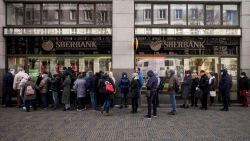The US and its European allies on Friday announced new sanctions on Russian President Vladimir Putin, in a rare move targeting a foreign leader’s personal wealth.
But the impact of those sanctions may be largely symbolic. Although Putin is believed to hold billions of dollars in personal wealth, little is known about the exact amount or where it might be.
Putin has left almost no paper trail for his assets — mostly property — which are hidden behind complex financial schemes organized by his confidantes, according to a 2016 “Panama Papers” report by the International Consortium of Investigative Journalists. Among the luxuries that have been linked to Putin’s friends and family, but never directly to him, are a $100 million mega-yacht and a Black Sea palace allegedly built for Putin’s personal use.
On paper, the Russian leader looks like a humble bureaucrat. In 2018, Putin submitted an official income declaration that shows he owns an 800-square-foot apartment in St. Petersburg, along with two Soviet-era cars and an off-road truck. The Kremlin says his annual income is about $140,000 — not an immodest figure in Russia, though hardly one that could keep Putin sporting his rotation of luxury watches.
“Putin’s visible watch collection is worth multiples of his official salary,” Bill Browder, an investor in Russia who became a fierce critic of Putin, told CNN in 2018. “The wealth came as a result of extortion and massive theft from state funds.”
$200 billion estimate
Browder testified before the US Senate in 2017 that he estimates the Russian leader’s wealth to hover around $200 billion in assets, which would make him among the wealthiest people on the planet.
One theory of Putin’s wealth suggests that he has strongarmed Russia’s oligarchs, threatening them with arrest or worse unless they fork over cash or stakes in their companies to him.
Still, tracking his wealth has proven next to impossible. Forbes magazine, which counts sleuthing the personal fortunes of the world’s elite as part of its core mission, said figuring out Putin’s net worth is “probably the most elusive riddle in wealth hunting.”
But just because the general public doesn’t have a good sense of where Putin’s assets are hiding, “we can assume that US and EU intelligence agencies and law enforcement agencies have been tracking his assets for years,” said Ross S. Delston, an anti-money-laundering expert.
“If the US government, along with the EU, were to get serious about going after his assets, there’d be a lot of targets to hit,” Delston says. “They’d be all over the world … certainly within the bounds of the EU and the US.”
But would freezing Putin’s assets deter him from continuing the attack on Ukraine? Almost certainly not.
“We’re not talking about stopping anything,” Delston says. “We’re talking about punishing him.”
Which isn’t to say the sanctions are toothless. They might make only a dent in Putin’s total fortune, but they do undermine his credibility on the world stage.
In stressing how rare it is for the United States to personally target a head of state with sanctions, the US Treasury Department said Friday that “President Putin joins a very small group that includes despots such as Kim Jong Un, Alyaksandr Lukashenka and Bashar al-Assad.”
Further, Delston said, the actual sting of the sanctions won’t be painless for Putin.
“High net worth people tend to get attached to their assets, even though they have plenty in reserve.”
— CNN’s Ivana Kottasová contributed to this article.























